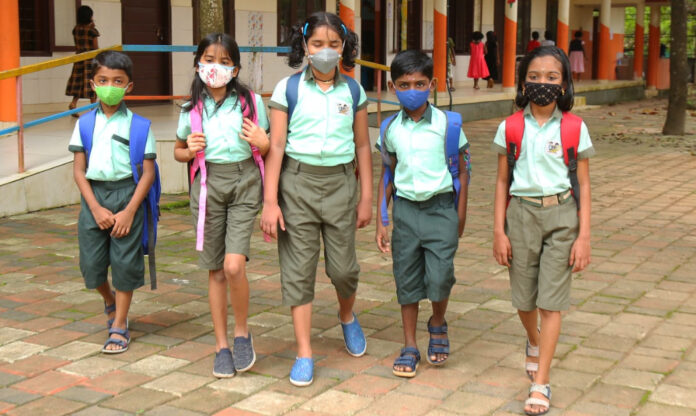NEW DELHI: When 16-year-old Neha Prashant Abija began to wear shirts and trousers to school last month, the change from standard academic dress offered a welcome taste of freedom — and a break from the norm that has dominated Indian schools since the 19th century.
Uniforms have been mandatory at Indian schools, borrowed from the English education system introduced during British rule of the subcontinent.
Boys usually wear light-colored shirts and trousers or knee-length shorts, while the dress code for girls is a shirt and a skirt, or a long tunic and loose-fitted pants.
The norm no longer applies at Abija’s high school in Balussery, in the Kozhikode district of Kerala, a southern state where more than a dozen schools have broken with tradition by opting for gender-neutral dress.
“It’s a liberating experience, wearing a shirt and trousers as a school dress rather than a skirt,” Abija said. “The ease with which we move around without being self-conscious makes me feel good.”
Balussery Government Girls Higher Secondary School also has male students in the higher secondary section, but from mid-December allowed all students to adopt the same gender-neutral dress code.
“Students demanded the change and we were also of the same opinion. The overwhelming majority of the students supported the move to introduce gender-neutral dress,” the school’s principal, Indu Radhakrishnan, told Arab News.
Girls who do not want to wear trousers can still wear their traditional dress.
“We did not impose the choice,” Radhakrishnan said. “We gave the students liberty to modify the length of the dress or put on an extra coat.”
The move was not without opposition, she added, although not from the students.
“Some political parties formed a coordination committee and protested, trying to press me to revoke the decision. They also surrounded me in the office, but there was no question of going back.”
While Balussery is spearheading the sartorial revolution at the high school level, the move was inspired by the Valayanchirangara primary school in Ernakulam district, whose 750 pupils switched to shorts and shirts three years ago.
The initiative came from former Valayanchirangara student Benoy Peter, a development professional who used to lead the school’s parent-teacher association.
“I used to see girls having problems playing freely and sitting comfortably,” Peter told Arab News. “Wearing dresses also seemed to be affecting their self-esteem.”
The school also introduced textbooks to challenge gender stereotypes.
“We brought in images like a father cooking in the kitchen and children sitting at the dining table, and a woman driving the truck rather than a man,” he said.
“Our purpose was to introduce the idea of gender equality to young minds.”
Valayanchirangara school principal Usha Ayappan said that she is proud of the school’s efforts.
“Parents supported the move and this encouraged us to introduce the new dress in both pre-primary and, later on, in primary school as well.”
The school has won social media praise from Kerala Education Minister V. Sivankutty, who last year announced that gender justice and equality will be highlighted in the state’s school curriculum reform.
However, in some circles, the ideas remain controversial. One of the opponents of the change in uniforms, Dr. Zulifaqar Ali, secretary-general of the Kozhikode-based Muslim social group Kerala Nadvatul Mujahedeen, said the new dress code is not gender-neutral.
“They are introducing male dress to females,” he told Arab News. “In Kerala schools, pants and shirts are being introduced to girls also. They are not introducing skirts or sarees to boys.”
He added: “The government needs to improve the infrastructure of public schools instead of focusing on dress, which should be left to individual discretion.”
However, young students such as Sribala B. Nair, who attends the Valayanchirangara school, seem happy with the new uniform.
The nine-year-old said that she no longer fears her clothes will get dirty when she goes to the bathroom, and there is “no need to be self-conscious while playing.”
She added: “It feels so nice to wear shorts.”
India schools cautiously reopen even as COVID-19 warnings grow1,400 India schoolteachers resign in fake degree investigation

